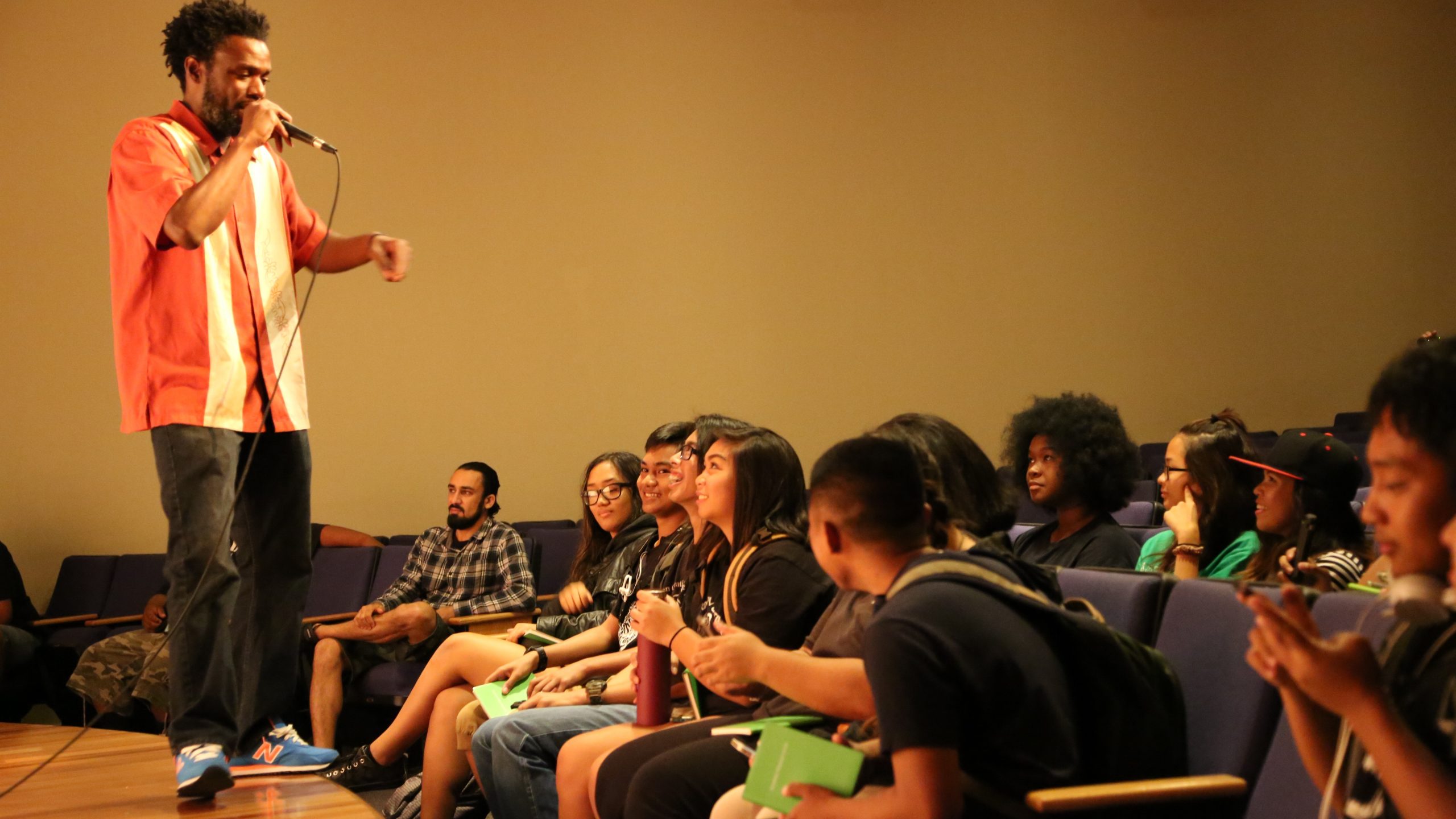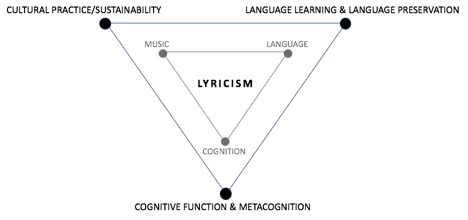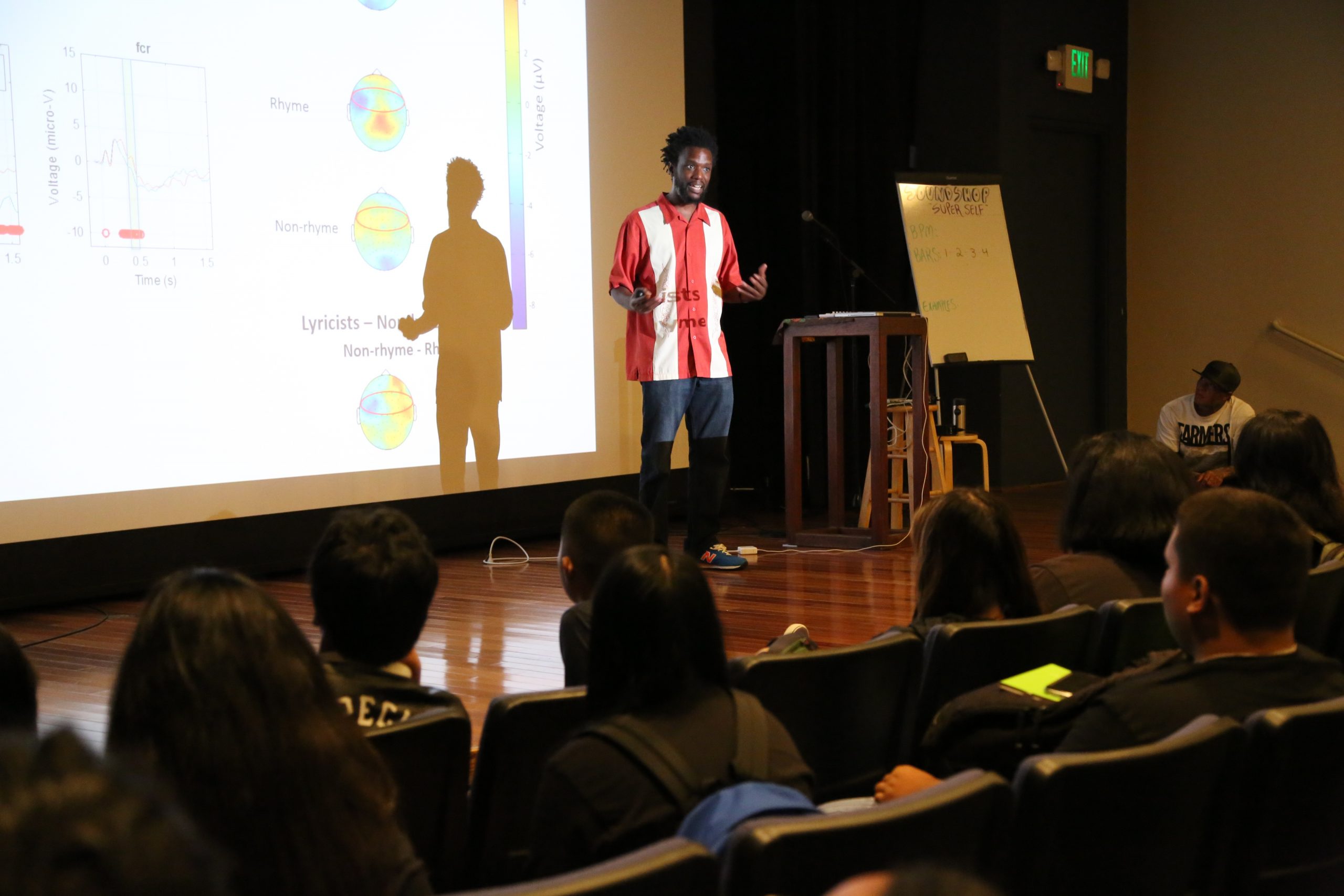HoMA Artist Spotlight: Keith Cross, M.C., Ph.D

Above: Keith Cross performing for students at HoMA’s Soundshop workshop. Top photo: Keith teaching students the science of lyricism and its impacts on the brain (Photo credits: Taylour Chang)
HoMA is spotlighting the work of artists in our community during these unprecedented times. The Doris Duke Theatre team asked lyricist and scientist Keith Cross to share more about his innovative work and what has been inspiring his creativity lately.
Keith, tell us about yourself as an artist and scholar:
As an artist, I identify most simply as a lyricist, and I probably spend more time honing my skills as a Hip-Hop lyricist (i.e., rapper/emcee), than any other type of lyric composition. However, I am also a singer/songwriter who loves writing and performing the Black musical forms I grew up on (e.g., R&B, Blues, Gospel, Jazz). Writing love songs, or “baby-making music” is actually one of my favorite things to do. To me there’s something special to being able to get folks in the mood, ‘cause none of us would be here without it! Then there’s music that articulates struggle and resilience and for me that’s writing blues or blues adjacent songs.
As a scholar, I conduct asset-based research that highlights the ways in which the cultural practices of different peoples uniquely contribute to our understanding of human abilities. My specific research focus is on cognition and learning in relation to lyricism, which I define as the practice of communicating ideas through the composition and performance of song lyrics. In my most recent work, I studied the brains of expert freestyle (improvisational) rappers and laypersons to understand neurological adaptation related to rap practice. In a nutshell, we found evidence that expert rappers have neurological adaptations for the integrated processing of music and language, whereas laypersons show no evidence of such adaptation. And…I wrote a song about it: Metacognition.
Can you share more about why your area of expertise and artistic approach are so unique? What led you to the intersection of studying mind, freestyling, and education?
I think my work is unique for a few reasons, beginning with the fact that I am both an artist and a scholar, and up until this point, much of the scholarship on Hip-Hop lyricism has been conducted by people who are not lyricists. I’ve been rapping for about 30 years now, including freestyle. I’m intimate with the nuances of the craft, and arguably, obsessed. With freestyle, in particular, I am driven by the goal of absolute fluency in generating improvised rhymes at a high performance level in any musical or discursive context. In fact, I became a scientist to learn how to become a better lyricist, and in almost every way, I’m studying lyricism, or designing my studies of lyricism, from the inside out, or at the very least, with an insider’s insights.
As far as education, I’ve always felt that music is medicine, and can be used to empower, to educate, to inspire. I have dedicated my artistry to using music in this way, and my scholarship to figuring out how to do it better. I should note that the study of lyricism and its significance to education is not new. Lyricism is an age-old educational technology for the transmission and preservation of human knowledge or experience. In fact, humanity’s oldest known school of linguistics arose in ancient India, in direct response to lyricism, in an attempt to preserve, undisturbed, the wisdom believed to be contained in the Vedas, scriptures of transcendent truth composted by Rishi (i.e., enlightened poets). That said, in our present educational and scientific landscapes, the educational or developmental benefits that may result from attending to lyricism more deeply remain largely unexplored. This is where my work comes in.
To answer the second part, please allow me to go full-nerd for a moment…
The goal of my scholarship is to establish lyricism as an interdisciplinary education research field in our present era. I provide a model for this proposed field and an explanation below.

Keith Cross 2
Lyricism exists at the intersection of music, language, and cognition as indicated by the vertices of the center triangle above. In my research, I explore each of these vertices, and examine the affordances of using or attending to lyricism, in relation to areas of broader educational concern connected to each vertex. Essentially, I am guided by the question(s): What/How can the practice or study of lyricism contribute to our understanding (or optimization of): (1) cognitive function and metacognition (i.e., “thinking about thinking”); (2) language learning and language preservation; (3) cultural practices and cultural sustainability?
During these unprecedented times, what is inspiring you creatively?
I’m inspired by knowing that artists are needed. Knowing that lyricists are needed. Art has been playing a major role in keeping people sane and inspired during these times. While the pandemic is a problem in and of itself, the fallout is a manifestation of long-standing societal problems and inequities, and we can use this time to imagine and work towards something better. The continued devaluation of Black life (in the U.S. and globally), the most recent murders of Black people, and the public outcry that has brought innumerable people together to protest institutional racism–it’s all motivating me to make art that articulates what freedom can look like, as opposed to merely responding to oppression. Artists have the ability to help people see and believe in alternate possibilities. For example, as soon as the COVID thing happened, I wrote a song, Grow the Goods, basically telling people how and why to get started growing survival foods. It’s gotten more response than anything else I’ve posted on Instagram, I think, because of its usefulness.
While I pray deeply for the wellbeing of all who’ve been negatively impacted by the pandemic, I’m also inspired that time has allowed the Earth to begin to heal from this modern society’s abuses. I even think some of that healing is reflected in the recent surge of non-black allies to the Black Lives Matter movement. COVID-19 has kept people away from the grind, allowing them time to feel, to be more human, to want healing for themselves and others, and thus to respond to atrocities they might otherwise ignore. My heart is definitely aching and my mind in turmoil at seeing the continued murder of my people, but I also feel like I am healing and gaining even greater clarity of purpose, so I find myself composing music more regularly than usual, thinking of what I will create next (and how), so that I can possibly help people see, and prepare for a different tomorrow.

To support Keith’s work (@doctabarz), go to:
– Taylour Chang, Curator of Film & Performance
6.29.2020